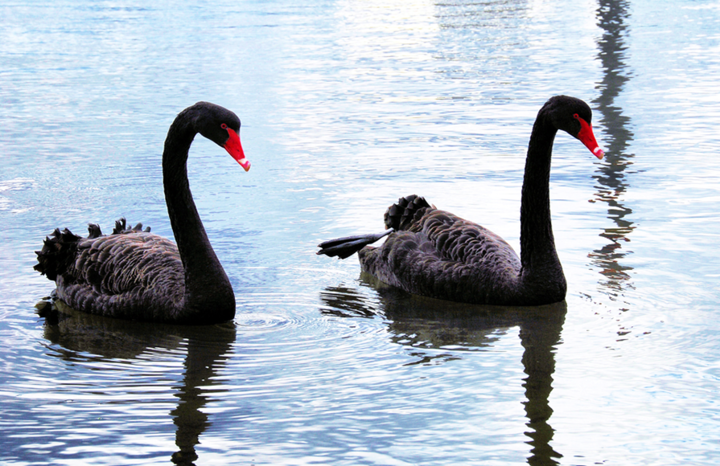
Jinan, Shandong Province, China – In a remarkable ecological event, a pair of black swans residing in the scenic Daming Lake of Jinan City, Shandong Province, has successfully hatched their offspring through natural incubation. This unprecedented occurrence marks the first instance of natural breeding of black swans at the popular urban lake since the commencement of record-keeping, signifying a significant milestone for the local ecosystem and captivating the attention of wildlife enthusiasts and the general public alike.
Daming Lake, a renowned tourist attraction and an integral part of Jinan's cultural heritage, has long been home to various avian species, including introduced populations of black swans. While these elegant birds have graced the lake's waters for a considerable period, their breeding success within the artificial environment has historically relied on human intervention. This recent natural hatching signifies a positive shift, indicating the adaptability and well-being of the black swan population within the lake's ecosystem.
The heartwarming event unfolded in the spring of 2025, as observant park management and visitors noticed the dedicated efforts of the black swan pair in constructing a nest along a secluded area of the lake's perimeter. Unlike previous instances where eggs were often collected for artificial incubation to maximize survival rates, this pair was allowed to proceed with natural incubation. This decision, likely influenced by the pair's strong bonding behavior and the stability of their chosen nesting site, proved to be a resounding success.
For weeks, the parent swans diligently took turns incubating their clutch of eggs, showcasing the characteristic parental care observed in this species. Black swans typically lay between four to eight greenish-white eggs, with an incubation period lasting approximately 35 to 40 days. During this crucial period, the devoted parents meticulously maintained the nest's temperature and humidity, warding off potential threats and ensuring the optimal conditions for embryonic development.
The culmination of their efforts arrived with the gentle cracking of shells and the emergence of fluffy grey cygnets. The exact number of successfully hatched offspring has yet to be officially confirmed by park authorities, but initial observations suggest a healthy brood. These newly hatched cygnets, while vulnerable in their early stages, are under the watchful care of their parents, who will fiercely protect them and guide them in their initial exploration of their aquatic habitat.
This natural breeding success holds significant ecological implications for Daming Lake. It suggests that the lake's environment, including water quality, food availability, and the presence of suitable nesting sites, has reached a level conducive to the natural reproductive cycle of black swans. This could potentially lead to a more sustainable and self-regulating black swan population within the lake, reducing the need for human intervention in their propagation.
Black swans (Cygnus atratus) are native to Australia and Tasmania. Their introduction to various parts of the world, including China, has often been for ornamental purposes in parks and lakes. While they can adapt to new environments, their breeding success in these introduced habitats can vary depending on factors such as climate, predation pressure, and the availability of resources. The successful natural breeding at Daming Lake highlights the favorable conditions present in this particular urban environment.
Park authorities at Daming Lake are reportedly monitoring the new swan family closely, taking measures to ensure their safety and minimize disturbance from visitors. This includes creating a protective buffer zone around the nesting area and educating the public about the importance of observing the swans from a respectful distance. The presence of the cygnets is expected to further enhance the visitor experience at Daming Lake, providing a rare opportunity to witness the early life stages of these majestic birds.
Local ornithologists and wildlife experts have lauded this event as a positive sign for urban biodiversity. The natural breeding of a relatively large and conspicuous species like the black swan indicates a degree of ecological health within the urban landscape. It underscores the potential for even human-modified environments to support natural reproductive processes when provided with adequate resources and a stable ecosystem.
Furthermore, this success story could serve as an inspiration for other urban parks and water bodies that host introduced avian populations. By understanding the factors that contributed to the natural breeding at Daming Lake, conservation efforts in other locations could be tailored to create more favorable conditions for similar natural reproductive events.
The natural hatching of black swan cygnets at Daming Lake is more than just a heartwarming story; it is a testament to the resilience of nature and the potential for wildlife to thrive even within urban settings. As the new swan family navigates the waters of Daming Lake, they symbolize a new chapter in the lake's ecological history and serve as a reminder of the delicate balance between human development and the natural world. The Jinan community and beyond will undoubtedly be watching their progress with keen interest, celebrating this rare and significant natural triumph. This event underscores the importance of maintaining healthy urban ecosystems that can support the natural life cycles of the diverse flora and fauna that call them home. The successful natural propagation of these iconic birds adds another layer of charm and ecological significance to the beloved Daming Lake.
[Copyright (c) Global Economic Times. All Rights Reserved.]






























